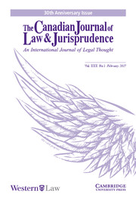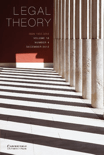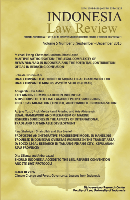
Canadian Journal of Law and Jurisprudence
Scope & Guideline
Navigating the Evolving Landscape of Canadian Law
Introduction
Aims and Scopes
- Interdisciplinary Legal Analysis:
The journal encourages contributions that analyze legal issues from various perspectives, including philosophy, sociology, and economics, highlighting the multifaceted nature of law. - Human Rights and Social Justice:
A significant focus on human rights, social justice, and the ethical implications of legal frameworks is evident, showcasing the journal's commitment to exploring law's role in promoting equity. - Theoretical Foundations of Law:
The journal delves into the theoretical aspects of law, including legal positivism, natural law, and moral philosophy, providing a platform for discussions around the foundational principles of legal systems. - Constitutional and Administrative Law:
There is a consistent exploration of constitutional principles and administrative law, particularly in the context of democratic governance and rights limitations, reflecting contemporary legal challenges. - Contract Law and Private Law Theories:
The journal frequently publishes work on contract law and private law theories, examining the complexities of legal obligations and the philosophy underpinning private legal relationships.
Trending and Emerging
- Animal Rights and Environmental Law:
Recent discussions on animal rights signal a growing interest in the intersection of law, ethics, and environmental justice, reflecting societal concerns about animal welfare and ecological sustainability. - Moral and Ethical Dimensions of Law:
The exploration of moral pluralism and the ethical implications of legal decisions indicates an emerging trend towards understanding law as a tool for achieving moral and ethical ends, rather than merely a system of rules. - The Role of Technology in Law:
There is a rising interest in the implications of technology on legal frameworks, particularly concerning automated decision-making in administrative law, indicating a need for legal adaptation in the digital age. - Public Law and Democratic Theory:
The journal is increasingly addressing themes related to public law, democratic governance, and the interplay between rights and state power, reflecting current debates about democracy and legal accountability. - Critical Perspectives on Legal Education:
Emerging critiques of legal education and its role in shaping future legal professionals suggest a trend towards re-evaluating legal training in light of current societal needs and expectations.
Declining or Waning
- Traditional Legal Doctrines:
There is a noticeable decrease in articles focused solely on traditional legal doctrines without a philosophical or critical lens, suggesting a shift towards more innovative and interdisciplinary analyses. - Historical Legal Analysis:
Papers that primarily focus on historical interpretations of law are less prevalent, indicating a potential waning interest in historical legal scholarship in favor of contemporary legal issues and their implications. - Narrowly Defined Jurisprudential Theories:
The journal seems to publish fewer articles that adhere strictly to narrowly defined jurisprudential theories, suggesting a move towards broader, integrative approaches that incorporate multiple perspectives.
Similar Journals

Legal Theory
Illuminating the Intersection of Law and PhilosophyLegal Theory, published by Cambridge University Press, stands as a significant academic journal dedicated to the exploration of the conceptual foundations and implications of law within the wider realm of philosophy. Established in 1995 and maintaining a consistent publication record through 2023, the journal has garnered a reputation for its high-quality scholarly contributions, reflected in its impressive rankings: Q2 in Law and Q1 in Philosophy as of 2023. With an impactful presence in the Scopus Ranks, Legal Theory is positioned 158th in Philosophy and 337th in Law, highlighting its relevance and influence—especially within the arts and humanities. This journal serves as a critical platform for researchers, professionals, and students who seek to engage with the intricate interplay between legal norms and philosophical inquiries. Though not open access, it offers a wealth of knowledge that is integral to advancing discourse in legal philosophy, making it an essential resource for those looking to deepen their understanding of contemporary legal theories and their implications.

Adelaide Law Review
Advancing legal scholarship in the heart of Australia.The Adelaide Law Review, published by the University of Adelaide, stands as a notable journal in the field of law, offering valuable insights into a wide range of legal topics relevant to practitioners, scholars, and students alike. With an ISSN of 0065-1915 and a history of publication that has evolved from 2019 to 2023, it serves as a platform for the dissemination of rigorous legal scholarship. Although currently categorized in Quartile 4 within the law category, the journal remains instrumental in contributing to legal discourse, particularly in the Australian context. With a Scopus ranking of #733 out of 1025 and a 28th percentile ranking in Social Sciences Law, the Adelaide Law Review is committed to advancing the understanding of vital legal issues through thoughtful articles, case analyses, and critical commentaries. This journal provides an essential resource for legal professionals and academic researchers seeking to engage with contemporary legal challenges. While it does not offer open access at this time, its scholarly contributions ensure it remains a respected publication within the legal community.

Melbourne University Law Review
Advancing Legal Scholarship with Insightful AnalysisMelbourne University Law Review, published by the MELBOURNE UNIV LAW REVIEW ASSOC, stands as a pivotal journal in the realm of legal scholarship in Australia and beyond. With an ISSN of 0025-8938 and an E-ISSN of 1839-3810, this esteemed publication has been a cornerstone for legal discourse since its inception. Designed to foster rigorous analysis and extensive debate, the journal covers diverse aspects of law, providing researchers, practitioners, and students an invaluable platform to engage with contemporary legal issues. The journal has demonstrated a commitment to high-quality scholarship, achieving a Q2 ranking in Law for 2023, further solidifying its importance within the academic community. Although not an open-access publication, the Melbourne University Law Review ensures that contributions remain accessible through institutional subscriptions, enhancing its reach and reinforcing its role as a critical resource for those dedicated to advancing legal knowledge and practice. For all stakeholders in the field of law—be they established academics or emerging professionals—this journal serves as a vital repository of innovative ideas and legal analysis.

QUEENS LAW JOURNAL
Innovating Legal Discourse for a Just TomorrowQUEENS LAW JOURNAL is a prestigious legal journal published by Queen's University, Faculty of Law, located in Kingston, Ontario, Canada. With its ISSN 0316-778X, the journal serves as a key platform for academic discourse and research in the field of law, encompassing various disciplines such as criminal law, constitutional law, and international law. Although currently not available as Open Access, the QUEENS LAW JOURNAL maintains a strong reputation for publishing impactful research, making it a vital resource for legal scholars, practitioners, and students alike. By fostering an environment for innovative legal theories and critical analyses, the journal plays an essential role in advancing legal scholarship and promoting informed discussions on pertinent legal issues. Emphasizing quality and rigor, the QUEENS LAW JOURNAL is a valuable addition to any academic library and serves as a trusted reference for those engaged in the legal profession.

Indonesia Law Review
Fostering Scholarly Discourse on Legal ChallengesIndonesia Law Review is a premier open-access academic journal dedicated to advancing knowledge in the fields of law and social sciences, with particular emphasis on the Indonesian legal landscape. Established by the Indonesian Law Review, this journal has made significant strides since becoming open access in 2014, ensuring that research is freely available to a global audience. Based in Depok, West Java, the journal seeks to foster scholarly discourse on legal issues pertinent to Indonesia, while also contributing to the broader field of education and social sciences. With its current Scopus rankings placing it within the top tiers of law and social sciences, including a Q3 categorization in law and a Q4 classification in education and miscellaneous social sciences, the **Indonesia Law Review** serves as a vital platform for researchers, professionals, and students to disseminate their findings and engage with contemporary legal dilemmas. The journal is committed to providing a robust forum for innovative legal scholarship and is an essential resource for anyone seeking to understand the complexities of law in Indonesia and beyond.

NOTRE DAME LAW REVIEW
Exploring the Frontiers of JurisprudenceNOTRE DAME LAW REVIEW is a premier scholarly journal published by Notre Dame Law School, renowned for its rigorous examination and commentary on legal issues and the evolving jurisprudence of the United States. Established in 1926, the journal has become a vital resource for legal scholars, practitioners, and students, consistently earning a reputation for excellence as evidenced by its Q1 category classification in Law for 2023. With a solid ranking within the Scopus Social Sciences index, placing at #413 among 1025 journals, it captures significant contributions to legal scholarship, making it an essential part of any legal researcher's library. Though it does not currently offer open access options, the journal's impact is underscored by its rich history and commitment to advancing legal discourse. Scholars looking to stay abreast of the latest legal developments and analyses will find NOTRE DAME LAW REVIEW an indispensable tool for their research and practice.

SOUTHERN CALIFORNIA LAW REVIEW
Connecting Scholars and Practitioners in LawSouthern California Law Review is a prestigious academic journal published by the University of Southern California, focusing on the expansive field of law. With an ISSN of 0038-3910 and a continuous publication record since 1973, this journal has established itself as a vital platform for legal scholarship and discourse. It holds an impressive Q1 ranking in the law category for 2023 among academic journals, reflecting its significant impact and reputation within the legal community. The journal encompasses a wide array of topics designed to foster rigorous debate and critical analysis, making it a crucial resource for researchers, practitioners, and students alike. Although currently not open access, it consistently aims to provide in-depth scholarly articles that contribute to the development and understanding of law across various dimensions. As it continues to evolve until 2024, Southern California Law Review remains an essential resource for anyone committed to exploring the nuances of legal theory and practice.

DUKE LAW JOURNAL
Pioneering insights for the legal landscape.DUKE LAW JOURNAL is a premier scholarly journal published by Duke University, dedicated to advancing the field of law through rigorous research and critical analysis. With an ISSN of 0012-7086 and an E-ISSN of 1939-9111, this distinguished journal has established itself as a vital resource for legal scholars, practitioners, and students alike. As a member of the top quartile (Q1) in Law for 2023 and ranking 267 out of 1025 in the Scopus database, the journal showcases high-impact articles that contribute to the contemporary discourse on legal theory, practice, and reform. While it does not currently offer open access, its rich archive since 1978 provides invaluable insights into significant legal developments in the United States and beyond. The DUKE LAW JOURNAL serves not only as a repository of knowledge but also as a forum for diverse perspectives, making it an essential tool for anyone engaged in the legal profession or academia.

Rutgers University Law Review
Empowering discourse, shaping legal futures.Rutgers University Law Review is a premier legal journal published by Rutgers University, dedicated to advancing scholarly discourse in the field of law. Established to serve as a platform for legal practitioners, academics, and students, this journal showcases a rich tapestry of articles, notes, and commentaries that critically engage with contemporary and historical legal challenges. The journal, indexed with an ISSN of 2374-3859, provides open access options, ensuring that its valuable insights are readily available to the global legal community. The Scopus ranking places it at a commendable 61st percentile within the domain of Social Sciences and Law, highlighting its significance and impact in the legal scholarship landscape. By fostering an environment of rigorous academic inquiry, the Rutgers University Law Review continues to play an essential role in shaping future legal frameworks and discussions.

CATHOLIC UNIVERSITY LAW REVIEW
Innovating Legal Discourse at the Heart of D.C.CATHOLIC UNIVERSITY LAW REVIEW is a premier legal periodical published by the Catholic University of America Press, located in the heart of Washington, D.C. with a dedicated focus on the intersections of law, education, and religious studies. Since its establishment in 1973, the journal has served as a critical platform for scholarly discourse, presenting innovative legal analysis and thought-provoking research that caters to scholars, practitioners, and students alike. With an ISSN of 0008-8390, this non-open access journal holds a notable place in the academic community, reflected by its category quartiles in 2023, ranking Q4 in Education and Law, and Q3 in Religious Studies. The Catholic University Law Review is distinguished not only by its commitment to advancing legal scholarship but also by its dedication to exploring the implications of law through a distinctly Catholic lens. Its consistent output of high-quality articles contributes to ongoing debates and developments in these fields, making it an essential resource for those interested in the legal implications of contemporary issues.